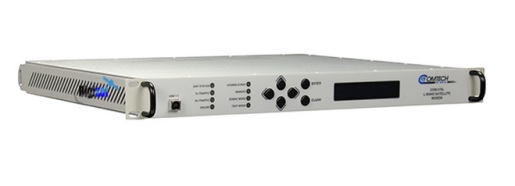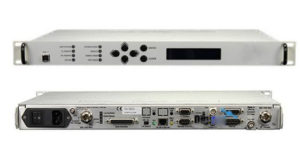Broadband IP Satellite Modems
The L-Band Satellite Modem offers variable data rate operation from 2.4 Kbps to 9.98 Mbps and supports all of the popular modulation types such as: BPSK, QPSK, OQPSK, 8-PSK, Patented 8-QAM, 16-QAM. It works with all BUCs and can be configured with and without a BUC power supply. In addition, this modem can be configured for IF-band operation from 50 to 90 Mhz or 100 to 180 Mhz.
Turbo Coding
The Comtech CDM-570L Series Brodaband Satellite Modems provide Turbo FEC which delivers exceptional performance and increased coding gain which enables exceptional bandwidth savings. Numerous additional custom options can be added in order to tailor the Comtech 570 to your exact requirements. The CDM570 offers lower decoding delays, and great bandwidth savings when compared to traditional modulation schemes.

IP Module
With its innovative architecture and support for advanced capabilities, IP Module-equipped versions allow for efficient IP networking and transport over satellite. It supports a wide range of applications and network topologies.
Header Compression Option
Configurable on a per route basis, header compression reduces the bandwidth required for VoIP by as much as 60%. Example: A G.729 voice codec, operating at 8 kbps, requires 32 kbps bandwidth once encapsulated into an IP/UDP/RTP frame. With compression, the same voice call needs only 10.8 kbps total WAN satellite bandwidth. Typical Web/HTTP traffic can also be reduced by 10% via IP/TCP header compression.
Payload Compression Option
Configurable on a per route basis, payload compression can reduce the required satellite bandwidth by up to 40%.
Quality of Service (QoS) Option
The modems support multi-level QoS to reduce jitter and latency for real time traffic, provides priority treatment to mission critical applications and allows non-critical traffic to use the remaining bandwidth.
Supported modes are:
• DiffServ – Industry-standard method of providing QoS enabling seamless co-existence in networks that implement DiffServ.
• Max/Priority – Provides eight levels of traffic prioritization with the ability to limit maximum traffic per priority class
• Min/Max – Provides a Committed Information Rate (CIR) to each user defined class of traffic with the ability to allow a higher
burstable rate depending on availability


